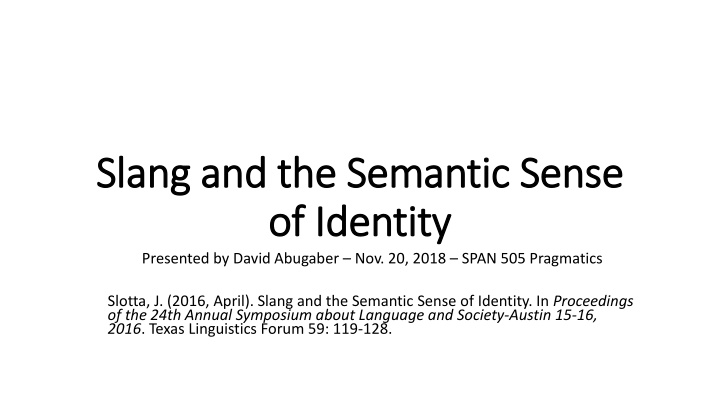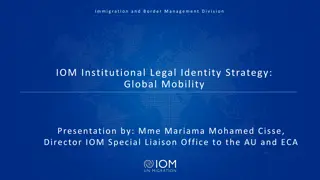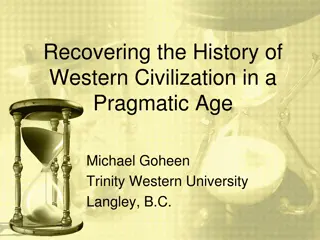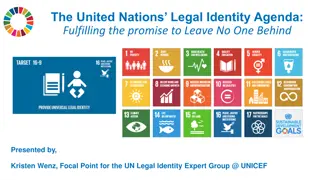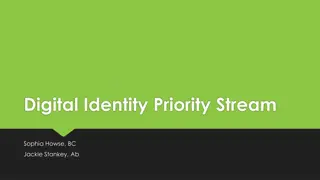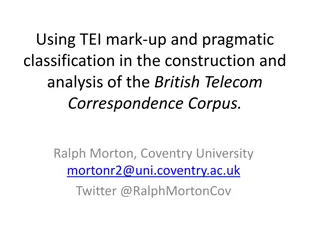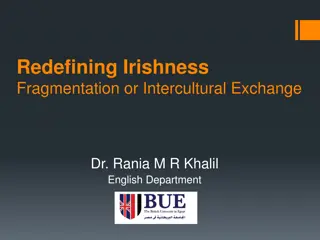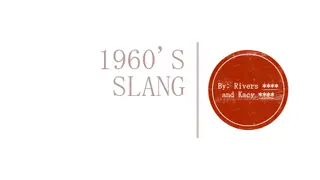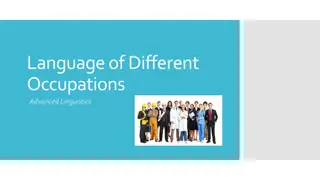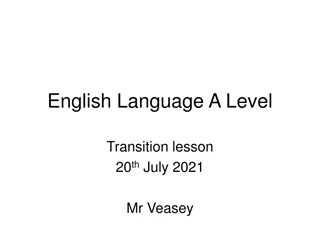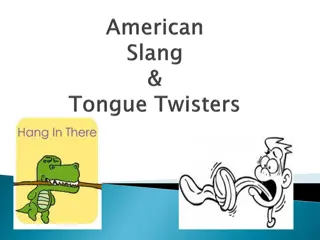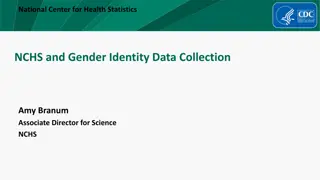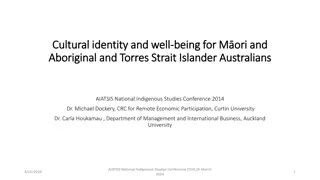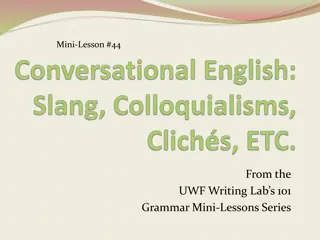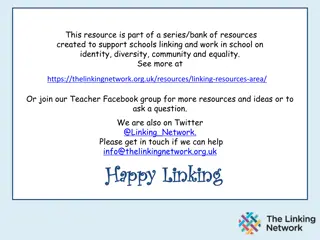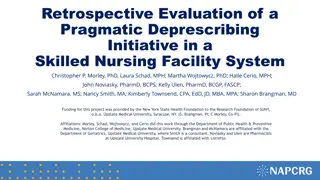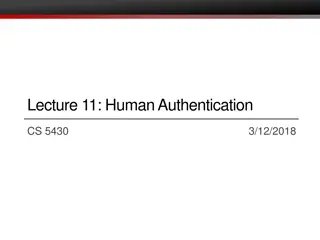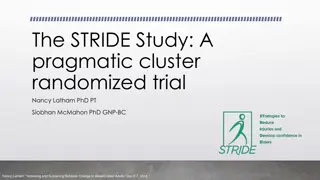Slang and Identity: A Pragmatic Perspective
Presented by David Abugaber, this study delves into the complex relationship between slang and identity, challenging traditional definitions by examining the semantic nuances of slang terms. Through case studies and analyses, the article explores the untranslatable nature of some slang words, the diverse voices that can wield slang, and how the use of slang acts as a marker of individual and group identity.
Download Presentation

Please find below an Image/Link to download the presentation.
The content on the website is provided AS IS for your information and personal use only. It may not be sold, licensed, or shared on other websites without obtaining consent from the author.If you encounter any issues during the download, it is possible that the publisher has removed the file from their server.
You are allowed to download the files provided on this website for personal or commercial use, subject to the condition that they are used lawfully. All files are the property of their respective owners.
The content on the website is provided AS IS for your information and personal use only. It may not be sold, licensed, or shared on other websites without obtaining consent from the author.
E N D
Presentation Transcript
Slang and the Semantic Sense Slang and the Semantic Sense of Identity of Identity Presented by David Abugaber Nov. 20, 2018 SPAN 505 Pragmatics Slotta, J. (2016, April). Slang and the Semantic Sense of Identity. In Proceedings of the 24th Annual Symposium about Language and Society-Austin 15-16, 2016. Texas Linguistics Forum 59: 119-128.
Warm-up questions Think of an example of a slang term. Can you think of a standard translation for this slang term? Can every slang word be translated to formal English? What slang term do people often misuse? Does it bother you? How would you define slang ? Can you use a slang term without adopting the voice of the kind of people who typically use that slang term?
Outline 1. Previous definitions of slang are inadequate 2. Are semantics and pragmatics really distinct? CASE STUDY: Slang terms for drunk 3. Some slang is untranslatable CASE STUDY: Hook-up 4. Slang terms can be used with/by/for many different voices CASE STUDY: The Voices of Don Gabriel 5. How you talk about slang is itself a marker of identity CASE STUDY: Throw shade
1. Previous definitions of slang are inadequate Definitions typically emphasize pragmatics, i.e., the relationship between the slangy speech and external context: Slang is a way of indicating something about the speaker s identity Slang is a mode of fostering in-group solidarity among interactional participants Slang marks the informality of the speech event, etc. Some example definitions from previous literature: an ever changing set of colloquial words and phrases that speakers use to establish or reinforce social identity or cohesiveness within a group or with a trend or fashion in society at large (Eble, 1996, p. 11) Slang terms are defined by their undeniable lack of dignity and their deliberate, widespread use within a social group... to defy social or linguistic convention (Dumas & Lighter, 1978, p. 16). Spears list of 10 characteristic features of slang (1981, p. viii): 1. Slang is not considered suitable for formal or serious matters; 2. Slang terms are usually synonymous for standard terms; 3. Slang terms and slang speech symbolize a lack of allegiance to social conventions... Meanwhile, the meaning of slangy words and expressions often appears to be little more than a curiosity, something of merely teratological [abnormality-related], ludic [playful], or informational interest. (p. 119) Scholars have assumed that slang is largely synonymous with Standard Language alternatives Coleman: [m]ost slang words are optional substitutes for synonyms in Standard English (2012, p. 109)... using slang makes it possible to say more or less the same thing in a variety of ways (2012, p. 110). Eble: [s]lang usually provides an alternative vocabulary for referents already named in the language (1996, p. 49). This article challenges this view & takes a deeper look at the semantics of slang
2. Are semantics and pragmatics really distinct? Labovian approach dissociates semantics and pragmatics [s]ocial and stylistic variation presuppose the option of saying the same thing in several different ways: that is, the variants are identical in referential or truth value, but opposed in their social and/or stylistic significance (Labov, 1972, p. 271) Silverstein (2003, p. 2012): registers are different ways of saying the same thing BUT these views dichotomiz[e] social meanings and semantic meanings in a way that is unwarranted (p. 120) this emphasis on the autonomy of pragmatics unduly limits accounts of pragmatic signaling by sidelining the contribution of semantic meaning (p. 121)
Case study: drunk blind, blitz-krieged, blown out, crispy, flipped out, fried, invertebrated, juiced, laid out, messed up, obliterated, ploughed, polluted, ripped out of one s gourd, ripped to the tits, saturated, slammed, smashed, totaled out, trashed, toasted, whipped, wiped out (from Eble, 1996, p. 45) Are these all just informal ways of saying drunk ? TOASTED: can also be related to other drugs MESSED UP: also means crazy, unfair, not right, etc. SLAMMED: too much work can also make you slammed WIPED OUT: too little sleep can also wipe you out Same referent, but different Fregean sense Example of Fregean sense: Superman vs. Clark Kent SURPRISE MINI ACTIVITY: Do these all mean the same thing?
3. Some slang is untranslatable, e.g., hookup The term Hook-up is arguably vague it can range from kissing to #*&$^!(*#$@ Or simply a different way of slicing up the world? it is not so much that the term hookup is vague or imprecise; it is that there is no Standard Language term semantically equivalent to it. DIFFERENT SEMANTIC TARGET: hookup emphasizes that an act of physical intimacy, whatever it may be, is performed outside of the bounds of a relationship, relationship expectations, and emotional attachments. Students definitions of hook-up (Freitas, 2013, p. 21): one sexual encounter that has no commitment involved ; purely physical [and] emotionally unattached. the non-equivalence of the term with Standard English alternatives is not a sign that the term lacks a precise meaning, as if the lexical distinction drawn in Standard English between kissing and having sex is a fundamental metaphysical distinction that must be reflected in all terms for physical intimacy. If we were to take this distinction as fundamental, we would have to condemn the imprecision of Standard English terms for acts of physical intimacy (e.g., kissing, having sex) because they fail to indicate whether such acts were done with emotional investment within the bounds of a relationship, or whether they were done purely for physical pleasure. Same story for: friend with benefits, booty call, one-night stand, f*#$ buddy set of slang terms, in contrast, provides a rich taxonomy of sexual relationships in which sexual gratification apart from emotional connection or romantic involvement is the prime concern While these terms can be defined in Standard English using periphrastic equivalents, they stake out a semantic space that is not lexicalized in Standard English ILLUSTRATION: Quechua evidentiality distinctions SURPRISE MINI ACTIVITY: Have you heard the term hook up before?
What is a voice? semantic difference provides semiotic material with which to constitute a voice (Bakhtin, 1981), [i.e.] a distinctive identity-conferring position on some matter. The Voices of Don Gabriel by Jane Hill (1995): Narrative from Don Gabriel, a subsistence farmer in central Mexico who speaks the Native American language Mexicano Recounts story of murder of his adult son due to envy & suspicions tied to son s position as treasurer of a local bus service. Don Gabriel s narrative implicitly stages a contest of value systems: A) Indian subsistence farmers (who are committed to reciprocity among kin & villager) vs. B) Spanish-oriented world of individualistic urban capitalists. Virtually none of the moral contest takes explicit, overt propositional form... Instead, it emerges in Don Gabriel s stylistic variation, e.g., in: language switching between Mexicano and Spanish different kinds of dysfluency (false starts, stutters, verbal slips, memory gaps, and so forth) shifts in the use of verb tenses changes in intonation contour. Don Gabriel shifts between the voice of: a neutral narrator, an engaged narrator, an emotionally overcome protagonist (the murder victim s father), and a moral commentator on the events the narrator is portraying. Don Gabriel uses only Spanish vocabulary when referring to the dealings for profit, as if verbal control over reference could sustain the moral boundaries his community attempts to draw around the world of commerce. (Keane, 2011) Keane, W. (2011). Indexing voice: a morality tale. Journal of Linguistic Anthropology, 21(2), 166-178.
Parallel example: locker room anecdote re: talk of endorsements, sports scholarships, trademarks, etc.
4. Slang terms can be used with/by/for many different voices SURPRISE MINI ACTIVITY: Terms like hookup do not constitute a voice by themselves Many opposing perspectives can draw on the semantic resources from these terms. Possible voices: The voice of the sexual conquistador bragging of their own hookups The voice of the slut shamer pointing out another person s hookups The voice of the journalist/academic who talks about hook-up culture in college campuses In these cases, use of the word hook-up is part of a language-mediated, identity-enacting social activity: speakers can affiliate with or distance themselves from the terms they use (and their denotata) ... It appears that hookup culture on college campuses, to the extent that it exists, is constituted more through this sort of talk about hooking up than through hooking up itself. College students overestimate the amount of hooking up that goes on (Barriger & V lez-Blasini 2013; Lewis et al. 2007; Scholly et al. 2005; Stephenson & Sullivan 2009) the perception among college students that their peers are more sexually active than they are is, in fact, a misperception, one fostered by the prevalence of talk about hooking up (Holman & Sillars 2012). Through talk about hooking up, f$&% buddies, and the like, speakers locate themselves and other interactional participants in relation to an intricate social world... [creative use of these terms] provides material out of which pragmatic signals of identity are forged. The term hookup and its incorporation into the expression hookup culture stake out semantic ground that is used to formulate voices and otherwise inform interactional practices. At this interface of semantic sense and pragmatic significance, speakers affiliate or distance themselves from hooking up in enactments of identity and, in the process, give shape to the meaning of the expression the values and identities that this activity is linked to. TAKE-HOME MESSAGE: what goes under the heading of slang does its pragmatic work in part by dint of the semantic distinctiveness of its terminology. hook up Do you think the term hook-up is SURPRISE MINI ACTIVITY: positive or negative? For each of these voices, come up with an example quote that uses the term
5. How you talk about slang is itself a marker of identity It s not just what you talk about... it s also how you talk about what you talk about! ... whether two terms are taken to be different ways of saying the same thing or not is itself, potentially, of pragmatic significance.
5. How you talk about slang is itself a marker of identity It s not just what you talk about... it s also how you talk about what you talk about! ... whether two terms are taken to be different ways of saying the same thing or not is itself, potentially, of pragmatic significance. Such rich and nuanced accounts of the meaning of shade open up and in some cases constitute the evidence for arguments that the use and abuse of the term constitutes a form of cultural (mis)appropriation. the subtle art of throwing shade and the subtle art of identifying and talking about it are merged. [By using the term shade ], one identifies oneself as an appreciator of a high verbal art form a haute-couture rhetoric. metasemantic discourse is simultaneously metapragmatic discourse. semantics serves as a resource for pragmatics... an identity, a self, a voice are constituted through semantically distinct ways of speaking. Slang terms, then, are not always alternative ways of saying the same thing; in some cases, the pragmatic significance of slang terms hinges on the fact that they are ways of saying something different altogether.
And the Gileadites took the passages of Jordan before the Ephraimites: and it was so, that when those Ephraimites which were escaped said, Let me go over; that the men of Gilead said unto him, Art thou an Ephraimite? If he said, Nay; DISCUSSION QUESTIONS Do you have any shibboleths (slang terms that index identity)? Have you ever defined a slang term for somebody? Did the act of defining the slang term itself feel like you were identifying as a user of the slang term? Can you think of a slang term that is untranslatable and/or stakes out a semantic space that doesn t really exist in formal English? What voices do you use in your everyday life? What specific words/terms do you strongly associate with that voice? MY EXAMPLE: Questionable Research Practice Does Slotta sanalysis hold for diner slang ? How about for the term woke ? Then said they unto him, Say now Shibboleth: and he said Sibboleth: for he could not frame to pronounce it right. Then they took him, and slew him at the passages of Jordan: and there fell at that time of the Ephraimites forty and two thousand
